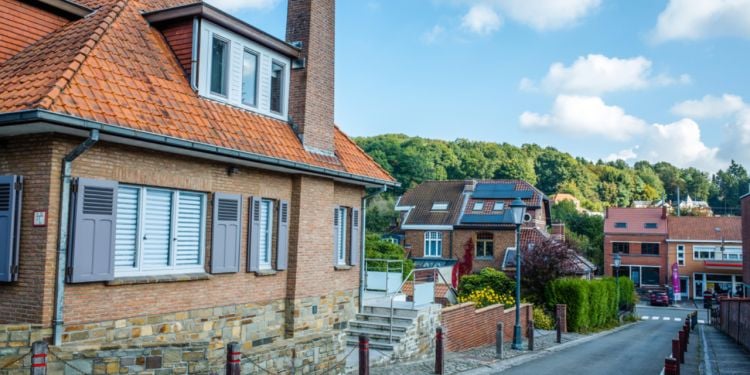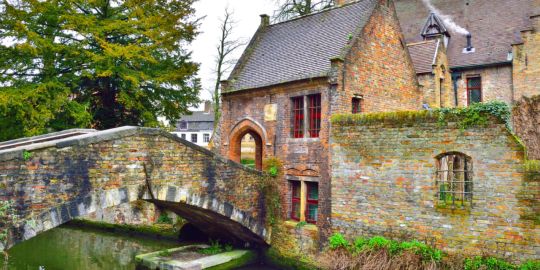Buying real estate in Brussels

Compared with other European capitals, buying property in Brussels is very affordable. Consequently, it's worth looking into the real estate market if you intend to stay long. Buying property could also be a lucrative financial investment in the long run.
The downside, however, is that, like with most things in Belgium, a lot of bureaucracy is involved. Let's consider what you need to know when buying property in Brussels.
The real estate market in Brussels
While property prices in Brussels are rising, buying a house or apartment in Western Europe is still one of the cheaper capitals. For instance, the average price per square meter is around €4,200, which is very low compared to the nearby capitals of London and Paris. In the former, the average price per square meter is around €15,500; in Paris, it is about €10,700.
According to statistics collected by Statbel, the average price for an apartment in Brussels now stands at €255,500 in the first half of 2023 (an increase of 2% in the same period in 2022). However, the price does vary a lot by neighborhood, and the most expensive communes are the ones where the most expats are to be found.
House prices also mirror this pattern, and across the city, the average house price in the first half of 2023 was €480,000, with lower prices to be found towards the outskirts of the capital and in neighborhoods that don't have so many expats living in them. This is an increase of 1% compared to 2022.
The Brussels communes most sought after by expatriates are:
- Uccle;
- Ixelles;
- Forest;
- Saint-Gilles;
- Watermael-Boitsfort;
- Auderghem;
- Etterbeek;
- Woluwe-Saint-Laurent and Woluwe-Saint-Pierre.
The following map shows the median price by building type and municipality. In the first half of 2023, the median price for a closed or semi-closed house was :
- 259,500 € for Belgium;
- 175,000 € for the Walloon Region;
- 480,000 € for the Brussels-Capital Region;
- 295,000 € for the Flemish Region.
Can you buy property in Belgium as an expat?
In some countries, expats have restrictions or limitations when buying property. So naturally, you might be worried that you'll hit some roadblocks in Belgium.
The good news is that there are no restrictions for expats wanting to purchase property in Belgium. This means that even if you're a non-resident, you can buy a house or apartment if you have the funds to do it.
However, note that there are different tax implications based on whether or not you're a resident. Thus, when it's time to do your taxes, ensure your accountant understands your status in Belgium (resident vs. non-resident) so you can pay accordingly.
In addition, if you have plans to rent out your property, any income generated from these rentals (even short-term ones) must be reported to the Belgian tax authorities. If you fail to do so, then you risk paying a fine. This can be a 200% tax surcharge or up to €1,250.
On the other hand, you might be eligible for tax breaks. The amount will depend on the interest you pay, when you took out your mortgage loan, and your household (i.e., how many children you have). Consult with an accountant to find out more details.
How to find property to buy in Brussels
If you're lucky, you'll walk down the street when you see a property you like. There will be an orange sign that says ''te koop'' (in Dutch) or ‘'à vendre'' (in French), and there will be a phone number and/or email address you can call or message to learn more about the property. You can also arrange for a viewing this way.
Or you might have local connections through family, friends, coworkers, or online groups. Let your social network know you're looking to buy; you'll never know if they know someone who's about to sell a home right for you.
But how else can you find the ideal property you're looking for?
Many people work with real estate agents called ''immokantoor'' in Dutch and ''agence immobilière'' in French. These experts will have an inside look at the market and can direct you to perfect homes and apartments without you having to spend the time and effort to look for them yourself. They can also provide a wide range of services that'll ease you from the start to finish the home-buying process.
There are also property hunters (''chasseur immobilier'' in French) you can work with. They're like real estate agents but with more tailored services. Because of this, they'll cost more to use. However, it can be worth it if you're looking to buy in a popular neighborhood such as Ixelles.
If you choose a professional real estate agent or property hunter, opt for a fixed price, as this ensures no surprises. Many will try to charge you an hourly rate, which can quickly rack up.
If you'd like to do it on your own, there are many Belgian online property portals where you can search for homes and apartments. Logic-Immo and Immoweb are two of the most popularly used ones in the nation.
Getting a mortgage in Brussels
As mentioned earlier, mortgage loan interest rates in Belgium are meager, attracting many people to buy property.
In general, you can get either a fixed or variable-rate mortgage. Because mortgage interest rates are so low, you might think it's a no-brainer to opt for a fixed rate. However, several good reasons exist to apply for a variable-rate mortgage.
In the long run, you'll pay less for a variable-rate loan than a fixed-rate one. While you do have to worry about the interest rate increases, know that the maximum is capped at two times the starting amount.
In addition, if you want to sell your home before you repay your mortgage loan or you want to renegotiate for a better rate, you'll have paid off more capital than interest. This leaves you in a better financial spot.
No matter your mortgage type, they'll last at least ten years. Most Belgian homeowners choose mortgages of 30 years to spread out the costs without paying too much interest.
Of course, mortgage loans aren't that black and white, so it's best to speak with a professional. They'll be able to assess your situation, determine your goals, and suggest the best path forward to meet your goals.
The legal process of buying property
As aforementioned, Belgium is a very bureaucratic country, and as such, there are many rules and regulations for almost anything. Consequently, hiring an estate agent is an excellent idea, as they'll help you navigate the real estate market, get you the best deals, and ensure you fill in all the correct paperwork.
After you've found the house or apartment that you'd like to buy, you put in a bid, and in Belgium, this usually means putting in one lower than the asking price so that there's room for negotiation. At this stage, you'll want to look over your finances and think about heading to a bank to discuss a mortgage loan, which we've discussed in the above section.
There are some costs you need to consider when buying a place, such as notary fees, a deposit (which you'll have to pay upfront), and the registration fee for the property. This amounts to quite a tidy sum, as the warranty is usually 10% of the selling price, and the registration fee is set at 10% as well. Note that the registration fee is 10% in Brussels and Wallonia and 6% in Flanders. The good news is, in Brussels, you'll get an exemption called abatement on the first €175,000 you spend when buying property here. Here's a general idea of all the costs you'll have to pay:
- Deposit: 10%;
- Registration fee: 10%;
- VAT (you pay this instead of a registration fee if the property is under two years old): 21%;
- Notary fee: between 0.2% to 4%;
- Valuation: €200 (excluding VAT); not always required, but many mortgage lenders ask for it;
- Real estate agent fees: 3% to 5%.
Once a price has been agreed upon, there are several legal processes that you have to go through. This is definitely where estate agents come in handy. A lot of helpful information concerning the whole process can also be found on notaire.be.
The real estate paperwork in Belgium
The first paperwork to sign is a "commitment to buy" contract. Not all sellers include this, though, as it's optional. However, it does help to make the buyer commit to buying the property since it formalizes their interest and intent. They can, however, back out of the deal without it costing them anything.
This is why most people, after both parties have agreed on a purchase price and all of the formalities, sign a "contract of sale". This commits the buyer to buying the property and is a legal commitment. 10% of the property price is put down as a deposit. While the buyer can still back out (although rare), they'll lose the down payment on the property if they do so.
The buyer sometimes sends a surveyor to check whether the building is as the seller described and whether it's structurally sound and in good condition. Sometimes, the surveyor will be from the bank, and they come to check the conditions so that they can give the go-ahead and approve the loan.
The buyer and seller must have a notary representing them in negotiations, and both work together to produce the “notarized deeds”. This document must be in French or Dutch, transferring the legal ownership to the new owner.
Once the documents are signed, the new owner has four months to register the deeds at the local commune. They'll also need to pay the registration fee we mentioned earlier. As we mentioned earlier, in Brussels, the registration fee is set at 10% of the selling price of the property, but the first €175,000 is exempted from this fee. You also don't need to pay the fee if you're buying a new property under two years old. You will, however, have to pay 21% of the selling price in VAT.
Buying property in Brussels still represents excellent value despite all the accompanying fees.









